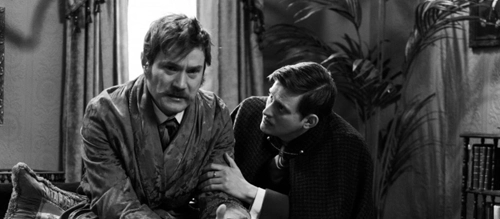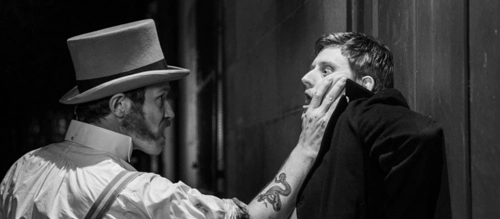The Strange Case of Dr Jekyll & Mr Hyde (2023) EIFF Review

The Strange Case of Dr. Jekyll & Mr. Hyde (2023)
Director: Hope Dickson Leach
Screenwriters: Hope Dickson Leach, Vlad Butucea
Starring: Lorn MacDonald, Henry Pettigrew, David Hayman
“The Strange Case of Dr. Jekyll & Mr. Hyde”, one of the most famous pieces of literature ever written and well over one hundred years old, has been reproduced, adapted and retold more times than one could count. With this in mind, any potential viewer of this latest film adaptation can’t help but to ask how anyone could bring a unique twist to this classic tale. Hope Dickson Leach intends to do so in their latest work, an adaptation made in collaboration with the National Theatre of Scotland, which debuted at the 2023 Edinburgh International Film Festival (EIFF).
The story follows a young lawyer, Gabriel Utterson (Lorn Macdonald), as he investigates the identity of a string of murders that have been linked to his friend Dr. Henry Jekyll’s assistant, Mr. Edward Hyde. Whilst searching for the truth, Utterson finds himself seduced by the powerful upper class of Edinburgh, which threatens to change Utterson for the worse.
Trading the original location of London for the Scottish capital Edinburgh seems like a great idea on paper. The sinuous alleyways and many staircases of nocturnal Edinburgh are a fitting replacement for London given its gothic architecture and genuine Victorian streets. In practice, this change in location causes issues that reverberate throughout the rest of the movie.
Though the backdrop of the Scottish capital is authentic, it feels as though there is very little done by the filmmakers to convince us that what we are seeing is set in the late 1800s. Not only is there little added to the setting in terms of decoration, but perplexingly little is also done to cover up many of the developments that these streets and buildings have seen over the past one hundred years. We see anti-bird netting over some of the buildings, master lock key boxes outside of houses. Not only does it shatter the illusion that the natural setting provides, but it illustrates a lack care on behalf of all involved.
This apparent lack of care finds itself infecting many of the other aspects of the movie, such as the props, costumes and the set dressings. Granted, it could be argued that once the initial illusion is broken then nothing else shall convince us, but much of the mise-en-scène is unconvincing: cheap costumes, spurious props, and the unmissably obvious use of electric candles – no flicker. The entire film, and almost everything captured on screen, seems insincere. And, once we notice this, it is almost impossible to believe in what is happening, let alone take it seriously.

Unfortunately, this lack of sincerity bleeds through into the performances. Arguably, Lorn MacDonald and Henry Pettigrew both give strong performances considering the material they were handed, but there are strange over the top moments throughout in which comedic touches are brought to both characters in such a manner that comes and goes seemingly at random. This creates an inconsistency with each of the leads, making it difficult to take them seriously or even connect with them.
Direction and screenwriting are the most likely reasons for such tonal issues, and the screenplay in particular is filled with problems. Originally beginning its life as a hybrid theatre production which used both film and theatre to tell its story, it makes sense that the transition would come with its own teething problems, but to see that the script’s many issues are not only still existent but highlighted to an even greater degree is somewhat disheartening.
While so many of the film’s issues are attached to the inconsistent quality of direction from Hope Dickson Leach, disappointing performances, and questionable production decisions, it all ultimately finds its way back to the screenplay. Whereas this adaptation claims to emphasise “themes of capitalistic greed and unscrupulous social ascension”, as well as tackling ideas of toxic masculinity, the execution is lacking depth and presented through obvious means, such as expository dialogue. It’s cheap and distracting, and in turn leaves us absent of any reason to engage with the film’s political position.
Given the promise and the potential behind The Strange Case of Dr. Jekyll & Mr. Hyde, and the image of what it could have been versus what has actually been made, one can’t help but to feel particularly let down and disappointed by this most recent adaptation of the literary classic.
Score: 7/24
Recommended for you: More Coverage from EIFF

